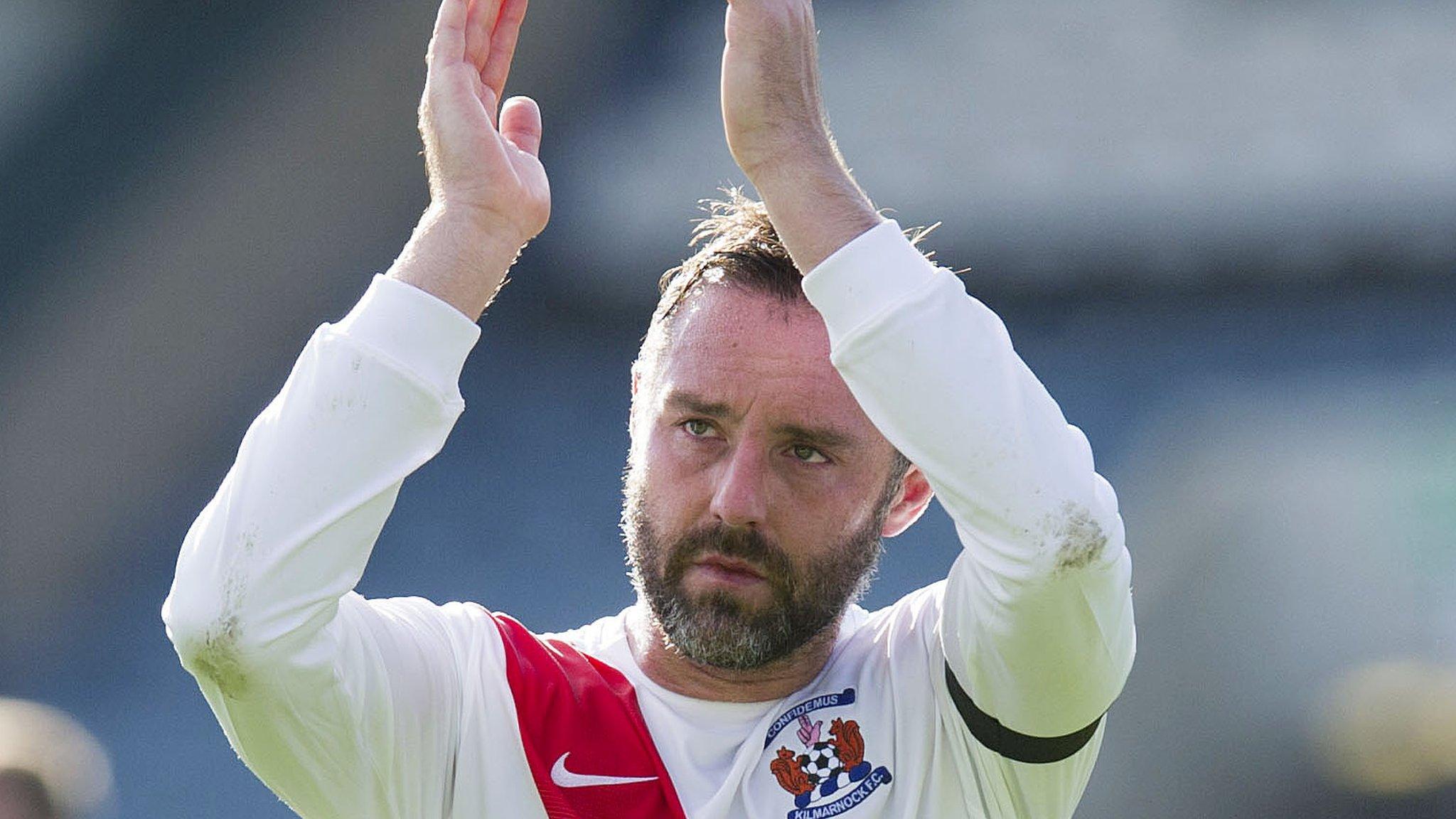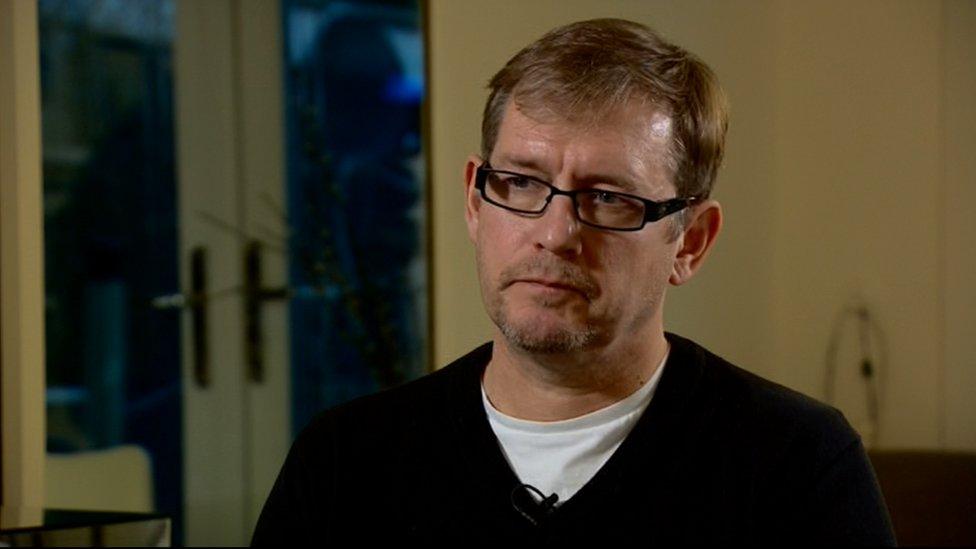Fifpro survey: Violent threats against players three times higher in Scotland
- Published

Players were caught up in a pitch invasion after May's Scottish Cup final
More than a third of footballers surveyed in Scotland say they received threats from the stands on a match day, according to a players' union.
The figure is revealed in a survey conducted by players' union Fifpro into the working conditions of nearly 14,000 male players in 54 countries.
A fifth in Scotland said they had suffered discrimination relating to race, religion or sexual orientation.
The views comprised 169 players from nine randomly picked Scottish clubs.
Worldwide, 7% of those polled said they had been approached to fix matches.
World players' union Fifpro said it had carried out the "biggest ever survey of professional athletes", external and the results "destroy the myth that all footballers are millionaires living in a protective bubble".
Celtic and Rangers were not among the nine randomly picked Scottish clubs from which 169 players were surveyed. No responses from England, Spain and Germany were included.
Among the findings are:
A player has an 11% chance of being approached to fix a match during their career.
41% of players are not paid on time - leaving them more vulnerable to approaches from match-fixers.
34% of Scottish players reported threats of violence on a match day - three times the global average.
20% of players in Scotland experience discrimination (about race, sexuality or religion) by fans.
About 10% of players worldwide are the victims of violence, meaning footballers are nearly twice as likely to experience deliberate physical violence (outside of the playing culture) than the average worker across other sectors. Most of this comes from attacks by fans.
There was also evidence of players being bullied at clubs, and pressured into moving against their will.
'What was deemed acceptable many years ago is not now'
Players were caught up in trouble at the end of May's Scottish Cup final as fans from both sides came on to the Hampden pitch after Hibernian beat Rangers.
Clyde manager Barry Ferguson said he had not witnessed abuse about a player's race or sexuality in Scotland, but religious abuse was a problem.
"Having played most of my career up in Scotland, I've suffered a bit myself, so I'm not surprised by the statistic, although it is disappointing," the former Rangers midfielder told BBC Scotland.
"I had it as well when I was down in England, but obviously not as much.
"Certainly, when you play up here with the big two, Rangers and Celtic, it is more religion-based, which is disappointing, but you learn to grow up with that being from the west of Scotland.
"The foreign guys who came in were surprised, shocked even, at the level of stuff that was aimed at them."
Ferguson, 38, said it was not just a problem for the Old Firm, and recalled a verbal spat with an abusive Clyde fan two years ago for which he later apologised., external

Barry Ferguson spent more than 10 years at Rangers over two spells and has been Clyde manager since June 2014
Fraser Wishart, chief executive of the Professional Footballers' Association Scotland, said his members had "made it clear" that "some supporters overstep the mark".
"We are approaching 2017 and what was deemed acceptable many years ago is not now," he said.
"What we call in Scotland 'banter' and comment about a player's performance are, of course, fine, but today's players are not willing to accept threatening, abusive or discriminatory chants and comment as part of our game."
Players were asked to respond to questions about pay, contract terms, transfers, fan violence, match-fixing and health.
The median net income of players surveyed is between £800 to £1600 a month.
Urging minimum employment standards throughout the sport, Fifpro general secretary Theo van Seggelen said: "We now have an evidence base for the reforms that are needed in the football industry.
"Overdue payables, forced transfers and training alone - all this must be a thing of the past."
Case study, Rhema Obed, former Arsenal youth

Rhema Obed had a wage dispute with Rapid Bucharest and knows players approached to fix games
London-born midfielder Rhema Obed was 21 when he signed for Romanian club Rapid Bucharest and found himself without pay for eight months.
His girlfriend, now wife, was eight-months pregnant with twins and they got by with financial support from their family, her job as a teacher and his friend, Rapid goalkeeper Dragos Balaru.
"It was obscene that I was asking them for money when I was playing," he said.
"I was getting food from my friend's family, his mother was cooking for me when I couldn't get food - and pretty much handouts."
Obed, now 25, who last played for Krsko in Slovenia, brought legal action against Rapid, with the help of world governing body Fifa, and received a settlement in the summer.
However, a week later, Rapid went bankrupt and he now lives in Sheffield, where he trains on his own in the hope of finding a new club in January.
Obed, who says the whole saga has significantly set back his career, says he knows of hard-up players who were approached to fix matches.
"Your average wage you're talking about is less than £1,000, if not £500, for some of these players abroad," he said of their monthly salaries.
"And they can make almost quadruple that from just conceding a goal. I haven't been approached, but I know people who have - and I know people who have probably done it as well who I won't mention."
- Published29 November 2016

- Published29 November 2016

- Attribution
- Published28 November 2016

- Published28 November 2016
